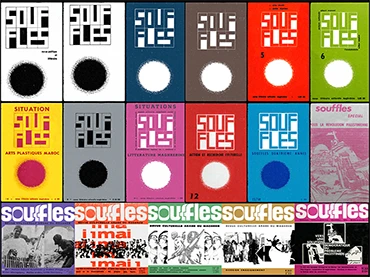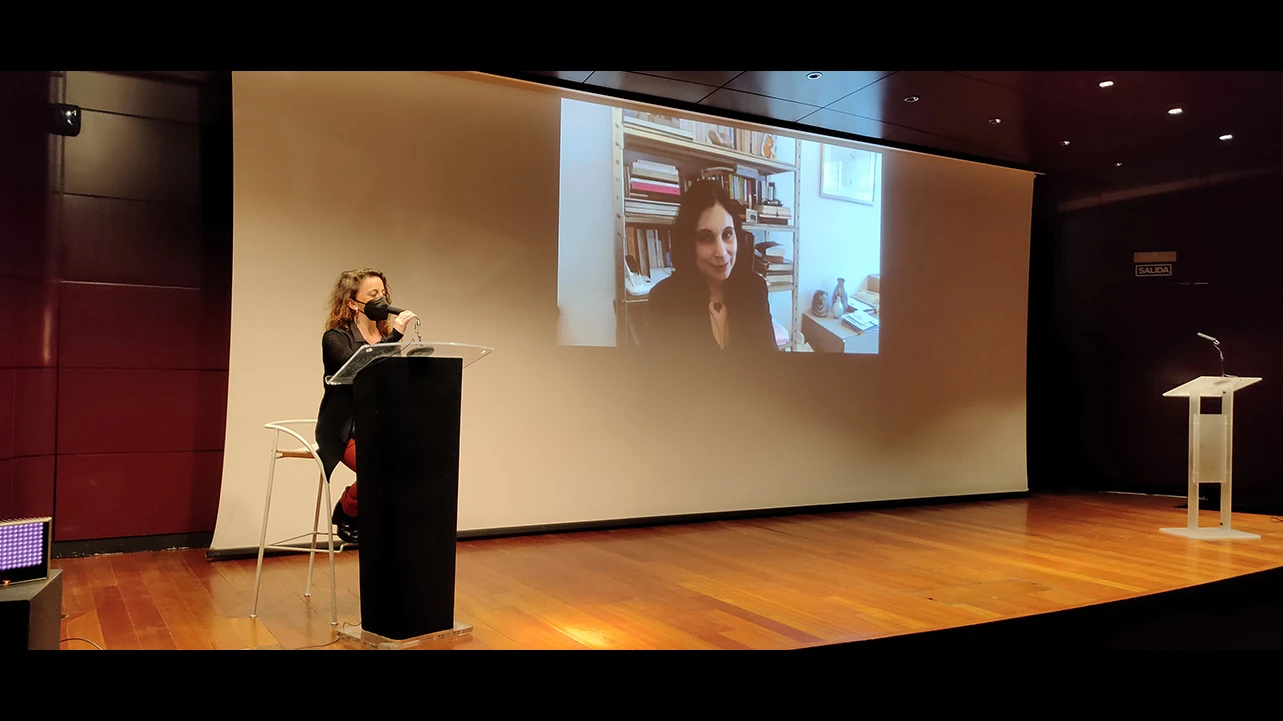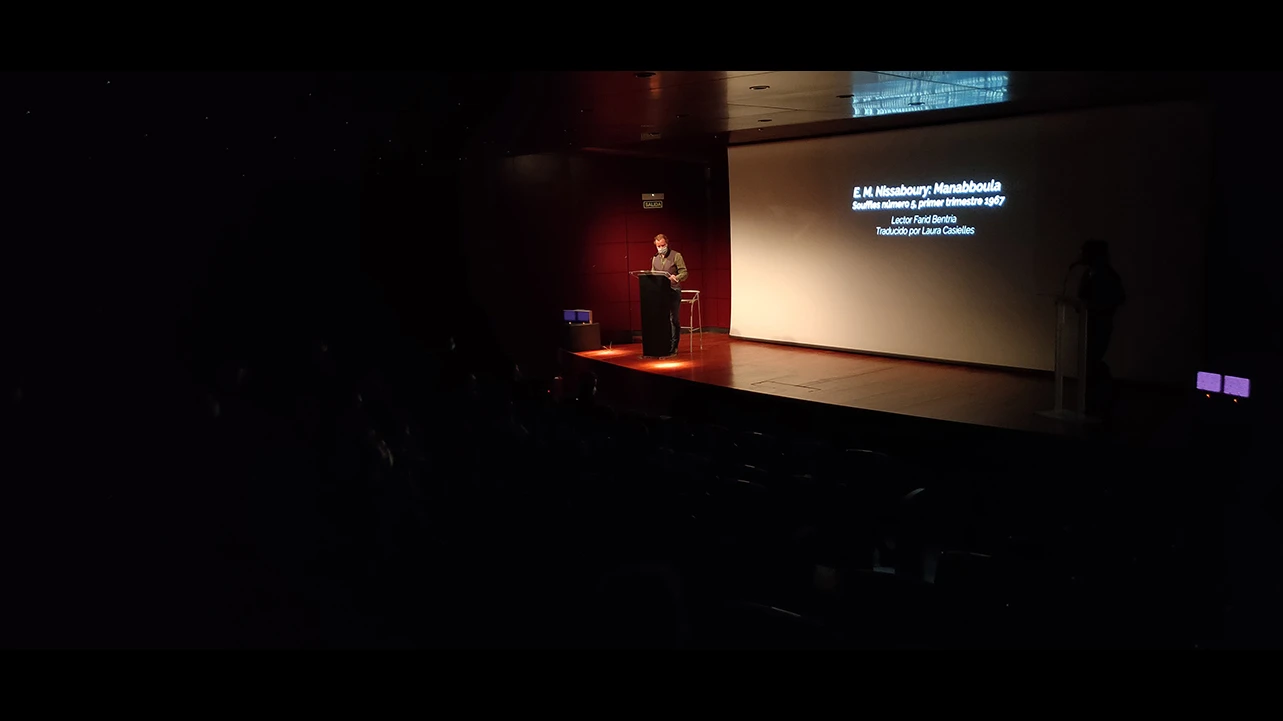Documents 17. Souffles (1966-1971)
An Art, Culture and Politics Magazine from Morocco

Held on 08 Apr 2021
The Documents programme explores the relationship between art and publishing activity, and other subjects that include the effects of archive on narratives of art history, the artist’s book and publishing as an artistic practice. This new edition analyses the Moroccan cultural journal Souffles — directed by poet Abdellatif Laâbi, it brought together the most relevant voices in poetry, art and thought from post-colonial Maghreb from 1966 until it was banned at the beginning of 1972.
Originally, Souffles, which can be translated as “winds”, sought to become a springboard for political and literary renewal in Morocco, encouraging experimentation and collective work. In just a few editions, it became the main form of aesthetic and political expression from the most advanced cultural scene, accommodating voices from cinema, such as Ahmed Bouanani, theatre, like Abdallah Stouky, and the visual arts, for instance Farid Belkahia, Mohamed Chabâa and Mohamed Melehi. Moreover, it published vehement manifestos on the future of a decolonialised national culture and the union between third-world countries and Maghreb people under a modern, independent and emancipated project; thus, it would be a key element to understanding Morocco’s artistic avant-garde and politics in the 1960s and 1970s. Today it is the subject of myriad research projects and essays and sits centrally in the exhibition Moroccan Trilogy 1950–2020.
This activity gets under way with an open letter by Abdellatif Laâbi from Paris, before continuing with lectures by Laura Casielles (in-person), a poet and journalist who is a specialist in Morocco and colonial memory, and Kenza Sefrioui (virtual), an editor and journalist, along with a reading of different manifestos and poetry published in Souffles, and translated into Spanish for the first time for this event. It will conclude with a dialogue between both speakers.
Reading list
- Abdellatif Laâbi (Preface), in Souffles, No. 1, first quarter, 1966, pp. 3–6.
- Mohammed Khaïr-Eddine, "Tract", in Souffles, No. 1, first quarter, 1966, p. 19.
- E. M. Nissaboury, "Manabboula", in Souffles, No. 5, first quarter, 1967, pp. 22–24.
- Abdellatif Laâbi, "Les singes électroniques", in Souffles, No. 16–17, final quarter, 1969 – January/February 1970, pp. 40–43.
Laura Casielles is a poet and journalist specialised in the memory of Spanish colonisation in Morocco and the Western Sahara. In this field she has published the research project Los cantos inolvidables. Souffles: una revista marroquí de poesía y política entre el colonialismo y los años de plomo (Alción Editora [Argentina], 2018) and directed the web documentary Provincia 53. Memorias cruzadas del Sáhara Occidental. As a translator of French, she has published the anthology of Moroccan poet Abdellatif Laâbi Desde la otra orilla (Valparaíso [Mexico], 2017). She currently contributes to different media and projects, particularly the magazine La Marea, for which she is a regular contributor and co-coordinates the culture section.
Abdellatif Laâbi is a poet, novelist, playwright, essayist, and Arabic-French translator, and was the director and co-founder of the magazine Souffles. In 1972 he was sentenced to ten years’ imprisonment in Morocco for his writings and political ideas. He was freed in 1980 following an international campaign and has lived in Paris since 1985. He has been honoured with the International Poetry Prize from the National Foundation of the Arts (Holland, 1979), the Pen Club Freedom Award (France, 1980), the Fonlon-Nichols Award from the African Literature Association (USA, 1999) and the Goncourt Prize for Poetry (France, 2009). His Spanish-language publications include El camino de las ordalías (Ediciones del Oriente y del Mediterráneo, 1995), Fez es un espejo: el fondo de la tinaja (Ediciones del Oriente y del Mediterráneo, 2004), La poesía marroquí: de la independencia a nuestros días (antología) (Idea, 2006) and Un continente humano (Idea, 2010).
Kenza Sefrioui is an editor, cultural journalist, literary critic and co-founder of the publishing house En toutes lettres. She is a specialist in the Souffles magazine, the subject of her PhD thesis and the published monograph La revue Souffles, 1966-1973 Espoirs de révolution culturelle au Maroc (Éditions du Sirocco, 2012). She previously directed the literary section of the French-language Moroccan weekly publication Le Journal Hebdomadaire, and today is a contributor with the Moroccan magazines Diptyk: l'art vu du Maroc and Tel Quel. She has published Le livre à l’épreuve, les failles de la chaîne au Maroc (En toutes lettres, 2017) and edited the books Casablanca œuvre ouverte (Le Fennec, 2012), Casablanca po�ème urbain (Le Fennec, 2013) and Casablanca, nid d'artistes (with Leïla Slimani, Malika, 2018).
Organised by
Museo Reina Sofía, Casa Árabe and Medialab Prado
With the collaboration of
Programme
Documentss
Inside the framework of
Related exhibition
Collaboration
illycaffèParticipants
Participants



Más actividades

Difficulty. Forms and Political Effects of Deviation in Writing and Contemporary Art
23 February – 14 December 2026 – Check programme
Difficulty. Forms and Political Effects of Deviation in Writing and Contemporary Art is a study group aligned towards thinking about how certain contemporary artistic and cultural practices resist the referentiality that dominates the logics of production and the consumption of present-day art. At the centre of this proposal are the concepts of difficulty and deviation, under which it brings together any procedure capable of preventing artistic forms from being absorbed by a meaning that appears previous to and independent from its expression. By ensuring the perceptibility of their languages, difficulty invites us to think of meaning as the effect of a signifying tension; that is, as a productive and creative activity which, from the materiality of art objects, frees aesthetic experience from the representational mandate and those who participate in it from the passiveness associated with tasks of mimesis and decoding.
The economy of the referential norm translates the social logic of capitalism, where insidious forms of capturing subjectivity and meaning operate. In the early 1980s, and adopting a Marxist framework, poet Ron Silliman highlighted how this logic entailed separating language from any mark, gesture, script, form or syntax that might link it to the conditions of its production, rendering it fetichised (as if without a subject) and alienating its users in a use for which they are not responsible. This double dispossession encodes the political strategy of referential objectivity: with no subject and no trace of its own consistency, language is merely an object, that reality in which it disappears.
The political uses of referentiality, more sophisticated today than ever before, sustain the neoliberal-extractivist phase of capitalism that crosses through present-day societies politically, economically and aesthetically. Against them, fugitive artistic practices emerge which, drawing from Black and Queer studies and other subaltern critical positions, reject the objective limits of what exists, invent forms to name what lies outside what has already been named, and return to subjects the capacity to participate in processes of emission and interpretation.
Read from the standpoint of artistic work, the objective capture of referentiality may be called transparency. Viewed from a social contract that reproduces inequality in fixed identity positions, transparent in this objectivity are, precisely, the discourses that maintain the status quo of domination. Opposite the inferno of these discourses, this group aims to collectively explore, through deviant or fugitive works, the paradise of language that Monique Wittig encountered in the estranged practices of literature. For the political potency of difficulty — that is, its contribution to the utopia of a free language among equals — depends on making visible, first, its own deviations; from there, the norm that those deviations transgress; and finally, the narrowness of a norm which in no way exhausts the possibilities ofsaying, signifying, referring and producing a world.
From this denouncement of referential alienation, fetishisation and capture, Difficulty. Forms and Political Effects of Deviation in Writing and Contemporary Art turns its attention to the strategies of resistance deployed by contemporary artists and poets. Its interest is directed towards proposals as evidently difficult or evasive as those of Gertrude Stein, Lyn Hejinian, Theresa Hak Kyung Cha, Kameelah Janan Rasheed, Kathy Acker, María Salgado and Ricardo Carreira, and as seemingly simple as those of Fernanda Laguna, Felix Gonzalez Torres and Cecilia Vicuña, among other examples that can be added according to the desires and dynamics of the group.
The ten study group sessions, held between February and December, combine theoretical seminars, work with artworks from the Museo Reina Sofía’s Collections and exhibitions, reading workshops and public programs. All these formats serve as spaces of encounter to think commonly about certain problems of poetics — that is, certain political questions — of contemporary writing and art.
Difficulty. Forms and Political Effects of Deviation in Writing and Contemporary Art inaugurates the research line Goodbye, Representation, through which the Museo Reina Sofía’s Studies Directorship seeks to explore the emergence of contemporary artistic and cultural practices which move away from representation as a dominant aesthetic-political strategy and redirect their attention toward artistic languages that question the tendency to point, name and fix, advocating instead for fugitive aesthetics. Over its three-year duration, this research line materializes in study groups, seminars, screenings and other forms of public programming.

Institutional Decentralisation
Thursday, 21 May 2026 – 5:30pm
This series is organised by equipoMotor, a group of teenagers, young people and older people who have participated in the Museo Reina Sofía’s previous community education projects, and is structured around four themed blocks that pivot on the monstrous.
This fourth and final session centres on films that take the museum away from its axis and make it gaze from the edges. Pieces that work with that which is normally left out: peripheral territories, unpolished aesthetics, clumsy gestures full of intent. Instead of possessing an institutional lustre, here they are rough, precarious and strange in appearance, legitimate forms of making and showing culture. The idea is to think about what happens when central authority is displaced, when the ugly and the uncomfortable are not hidden, when they are recognised as part of the commons. Film that does not seek to be to one’s liking, but to open space and allow other ways of seeing and inhabiting the museum to enter stage.

Intergenerationality
Thursday, 9 April 2026 – 5:30pm
This series is organised by equipoMotor, a group of teenagers, young people and older people who have participated in the Museo Reina Sofía’s previous community education projects, and is structured around four themed blocks that pivot on the monstrous.
The third session gazes at film as a place from which to dismantle the idea of one sole history and one sole time. From a decolonial and queer perspective, it explores films which break the straight line of past-present-future, which mix memories, slow progress and leave space for rhythms which customarily make no room for official accounts. Here the images open cracks through which bodies, voices and affects appear, disrupting archive and questioning who narrates, and from where and for whom. The proposal is at once simple and ambitious: use film to imagine other modes of remembering, belonging and projecting futures we have not yet been able to live.

Remedios Zafra
Thursday March 19, 2026 - 19:00 h
The José Luis Brea Chair, dedicated to reflecting on the image and the epistemology of visuality in contemporary culture, opens its program with an inaugural lecture by essayist and thinker Remedios Zafra.
“That the contemporary antifeminist upsurge is constructed as an anti-intellectual drive is no coincidence; the two feed into one another. To advance a reactionary discourse that defends inequality, it is necessary to challenge gender studies and gender-equality policies, but also to devalue the very foundations of knowledge in which these have been most intensely developed over recent decades—while also undermining their institutional support: universities, art and research centers, and academic culture.
Feminism has been deeply linked to the affirmation of the most committed humanist thought. Periods of enlightenment and moments of transition toward more just social forms—sustained by education—have been when feminist demands have emerged most strongly. Awareness and achievements in equality increase when education plays a leading social role; thus, devaluing intellectual work also contributes to harming feminism, and vice versa, insofar as the bond between knowledge and feminism is not only conceptual and historical, but also intimate and political.
Today, antifeminism is used globally as the symbolic adhesive of far-right movements, in parallel with the devaluation of forms of knowledge emerging from the university and from science—mistreated by hoaxes and disinformation on social networks and through the spectacularization of life mediated by screens. These are consequences bound up with the primacy of a scopic value that for some time has been denigrating thought and positioning what is most seen as what is most valuable within the normalized mediation of technology. This inertia coexists with techno-libertarian proclamations that reactivate a patriarchy that uses the resentment of many men as a seductive and cohesive force to preserve and inflame privileges in the new world as techno-scenario.
This lecture will address this epochal context, delving into the synchronicity of these upsurges through an additional parallel between forms of patriarchal domination and techno-labor domination. A parallel in which feminism and intellectual work are both being harmed, while also sending signals that in both lie emancipatory responses to today’s reactionary turns and the neutralization of critique. This consonance would also speak to how the perverse patriarchal basis that turns women into sustainers of their own subordination finds its equivalent in the encouraged self-exploitation of cultural workers; in the legitimation of affective capital and symbolic capital as sufficient forms of payment; in the blurring of boundaries between life and work and in domestic isolation; or in the pressure to please and comply as an extended patriarchal form—today linked to the feigned enthusiasm of precarious workers, but also to technological adulation. In response to possible resistance and intellectual action, patriarchy has associated feminists with a future foretold as unhappy for them, equating “thought and consciousness” with unhappiness—where these have in fact been (and continue to be) levers of autonomy and emancipation.”
— Remedios Zafra

27th Contemporary Art Conservation Conference
Wednesday, 4, and Thursday, 5 March 2026
The 27th Contemporary Art Conservation Conference, organised by the Museo Reina Sofía’s Department of Conservation and Restoration, with the sponsorship of the Mapfre Foundation, is held on 4 and 5 March 2026. This international encounter sets out to share and debate experience and research, open new channels of study and reflect on conservation and the professional practice of restorers.
This edition will be held with in-person and online attendance formats, occurring simultaneously, via twenty-minute interventions followed by a five-minute Q&A.